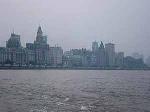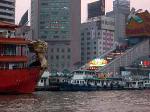- Getting around Lijiang. Dont stay in the Old Towns more than 2 days, there is nothing to do. KRISS Oct 9, 2013 05:46
- 2013 Beijing Temple Fair BENNYLAU Feb 26, 2013 03:29
- Malaysian traveling from KUL - LAX vis Shanghai PVG ZATI_DY Jan 3, 2013 20:15
Echoes of Jazz and Decadence - Part One
- Views: 2839
- |Vote: 0 0
- |Add to Favorites
- |Recommend to Friends
-Introduction-
The magnificent city of Shanghai has been written about many times by many of its admirers and detractors. Whilst Shanghai is admittedly one of China's greatest cities, if not one of the greatest cities in the world, few visiting Shanghai stop to think more deeply about what this place represents for China. Why does Shanghai have such an international face when the rest of this country looks so different? What's the relationship between Shanghai as a tourist destination, Shanghai as a modern city, and Shanghai as it is in itself? How are we supposed to feel as foreigners in this place?
When I first visited Shanghai, it made a very deep impression on me and led me to ponder over many such things. As a visitor to China with a view to a long term relationship with the country, I was very sensitive to the question of what it means to be a foreigner in China, and I found a lot of answers in Shanghai, China's most foreign city.
This article is the part one of three, and is translated into Chinese for readers within China.
The Settlers
The world has been telling its stories for such a long time now that the details have become impossibly intricate. We're each born in the middle of a dialogue, lost somewhere in the intrigue. We see nothing else, so we have to start out believing that the way life is at home is the right and normal way that the world should be. The environment of our childhood is assumed to be the standard for goodness in the world, which is why the word foreigner, by the time we come to learn it, will always carry some negative connotation.
For me, it was easy to accept that the situation into which I was born was intrinsically good, because the place where I grew up could hardly have been more idyllic. I am from a small orchard valley called Oratia, in the lush West of Auckland city, and it was quite simply a quiet paradise. My family, although we were not considered rich, lived in a large house on a grassy and beautiful property, and I was a bright and happy child.
Oratia, like most of New Zealand, is a relatively young location. It was settled just over a century ago, and the pioneers were blessed with fertile lands, and prospered. A small museum not far from my home depicted their early dwellings as peaceful and comfortable, and the pioneers themselves as benevolent and hard-working farmers. My own inheritance was a result of their efforts in building a community in that gorgeous valley.
Oratia's little school was sweet and idealistic, a place where we students received an education about a world that, we were told, was much better than it once was. We were taught that all people were equal, that we all had fundamental rights, and that we should be civil and kind to everyone we met. These, we learnt, were the principles of the great civilisation of the West, which had propelled our culture to the forefront of humanity, lighting the way for less fortunate races to follow. We also learnt that the pathway to this present time of civilised and mature stewardship of the Earth came only after years of trial, during which our ancestors had sometimes behaved with questionable prudence. If current society was enlightened, our history was problematic. In my own country the confiscation of ancestral Maori lands by the Europeans was a relevant case in point. The Maori - the native New Zealanders - had been unfairly robbed of their lands by the English who colonised the country. The impression I received from my studies was that this situation was largely an historical problem, and that both Maori and European were now co-existing peacefully. In any case, we were fortunate to be living in times when any disagreement could be discussed openly.
The interesting thing about such an education is that it eventually disproves itself. As I became more knowledgeable about my country and the world beyond, I realised that the history I had learnt was grossly prettified. The great civilised Western crusade was a disturbing historical war game: the assertion of European military power over the Earth. I was a beneficiary not of highly cultured heroes, but of decorated bandits. The English, and their contemporaries, infamously forced their influence throughout the globe, and pretty Oratia was just one of their stolen territories. Oratia was, by consequence, just a sweet apple on a tree with indisputably rotten roots. It is written that such a tree can never bear fruit that is wholly good.
The only way for a colonising race to maintain for its succeeding generations this charade of benevolence is by obscuring its privilege, pretending that the advantages of its society are the reward for centuries of development, not of stolen capital. The suggestion is that countries that are still developing have been a little slow and thus should expect no more than they have until they work a little harder. In reality, behind the easy comfort of New Zealand's peaceful society is the fact that this beautiful existence is denied to others by a mechanism of protection that is derived directly from the process of forceful and exclusive colonisation.
A few hundred years ago when the Maori people first saw the majestic galleys anchor on their shores, they were a poorly organised people with few technologies. The Chinese, however, were a race with a detailed and turbulent history, and were all too aware that such pretty ships could bear only poisons. Their mistrust of the Europeans then was well founded: the foreign devils brought bloodshed and opium and treason money, and they watched as these 'honourable guests' set up colony after colony on their territory. These luxurious seeds of Europe in the Orient were an insult to a people long since civilised and already set back by a millennium of foreign rule under the Mongols, and then the Manchus. The Europeans constructed showy palaces to humiliate local Chinese, in that these projected the illusion of European superiority. Their gross imposition upon the Chinese world was masqueraded as a demonstration of cultured excellence. The suffering Chinese often made the mistake of believing that their invaders, despite their incivility, were in some way better than their own people.
Foreigner in Shanghai
The greatest of all these colonies was Shanghai. Where the great Yangtze River finally comes to the sea, Shanghai was an ideal trading port for greedy imperialist foreign nations, and the city they built has become the most powerful and rich city in China today. To Chinese people, Shanghai's success represents a victory over the colonists. To me, however, as an initiate of China uncomfortable with my own inheritance from a culture of thieves, Shanghai is the most striking symbol of the defeat of Chinese morale in a country which, despite the glories entitled to China, is still somewhat under the spell that the Europeans cast there: that if the Chinese are to succeed in the world, they must think like Westerners. Shanghai is to me a place where China is ashamed of being Chinese. It is the symbolic capital of the lack of confidence that holds China away from world pre-eminence.
This is not to belittle the accomplishments of the people of China, or of Shanghai. Shanghai's emerging power is indeed a testament to the perseverance and strength of China's people. But there is an important difference between Shanghai and the other major Chinese economic centres I'd visited. Whereas in a city like Beijing there is also an atmosphere of development and relative wealth, it is an atmosphere that is unmistakably Chinese in flavour. I saw a cultural continuity between small towns like Zhangjiakou and with the capital. In Shanghai, however, the atmosphere of a rapidly growing economy has none of that, and I rather fear that when Shanghainese suggest that people from other Chinese cities are a little too backward, they are essentially saying that those people are a little too Chinese. It's almost as if Shanghai people see China's future as being transformed into something foreign.
By the time I reached Shanghai I had lived in China for almost nine months, had visited a total of 17 Chinese cities, and had a solid command of basic Chinese. But in every place I had seen, I had been dogged by a deep awareness of distance from China, that this country that I had grown to respect and love was one that would always see me with suspicion and mistrust. Every country has some sort of bias towards foreigners, but with China this is a barrier on the scale of the Great Wall, impossible to climb over from the outside, and one that is largely the fault of the arrogance with which foreigners have treated China for centuries. As my friend Steve and I walked along the world famous Bund on the morning of our arrival, and witnessed its intoxicating parade of old European architecture, I found myself growing increasingly uncomfortable. The fascinating thing about the Bund is the contrast between the century-old colonial constructions on the left bank of the Yangtze river, and the space-age modern skyrises on the far Pudong bank; what is most striking, however, is that the architecture on neither side is characteristically Chinese. I knew the basic history of the city, and to see American businessmen in expensive suits wandering self-importantly between these buildings that were once central to Chinese oppression, I had to wonder at their gall. Why hadn't these buildings been torn down after Chinese liberation? Did the Chinese people really think so lightly of their history? The Bund seemed to be resonating with the weight of European shamelessness.
*** To Be Continued ***






 Copyright © 1998-2026 All rights reserved.
Copyright © 1998-2026 All rights reserved.
1.
Sep 18, 2007 23:14 Reply
LADYMAGGIC said:
This is great.
I really enjoyed reading your review..
It has stirred me up to going to Shanghai..
I am now living in China and wondering where I should head to first..
Thanks
Maggi